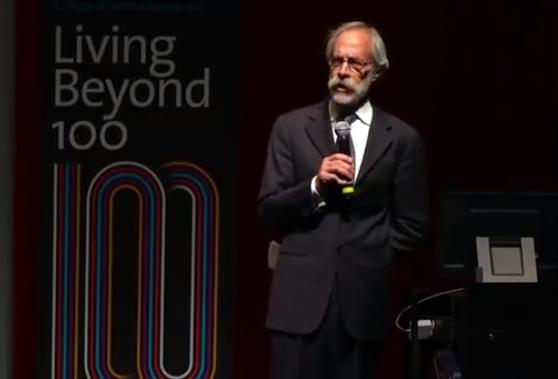Living Beyond 100
Many of today's children will live for a century or longer. Which factors will affect their longevity? Will they be happy, healthy and productive?
Emerging science and medical technologies provide many clues regarding the future of aging, but changing demographics and economics have also begun to influence society's views. Beyond doubt, each of us will face new levels of scientific complexity in this new world. This Spring, the College of Science will present six free lectures on the effects of long life,
addressing the opportunities and costs of the new longevity, the biology of aging, the effects of aging on the brain, regenerative medicine, the impact on global populations, and the increasing intimacy between informatics and the aged.
(from UA Science Lecture Series)
 |
1. Can We, and What if We Do?
Medicine and nutrition are also making rapid progress, and in many cases what were terminal diseases are becoming treatable inconveniences. But if being alive well beyond 100 years is possible, is it really "living"?
2. The Biology of Aging: Why Our Bodies Grow Old
All organisms age, but we really do not have a clear explanation how and why. This lecture will address theories of aging, emphasizing those that show most potential promise.
3. The Aging of the Brain
Over the past half-century, ideas about the aging brain have evolved away from it being an organ of passive deterioration towards the realization that it is capable of dynamic adaptation and high levels of function well past 100 years.
4. Repair, Regeneration and Replacement Revisited
From advances in composite tissue transplantation to stem cells to bionic human-machine interfaces, we are experiencing a present-day revolution in replacement parts.
5. Society, Geographic Change and the New Longevity
Aging will continue to present new challenges as our global population reaches toward 9 billion over the next 40 years. To better respond to the needs of our world's changing demographic distributions, it is critical that we understand the nature of aging at both global and local scales today.
6. Information and Immortality
Informatics will eventually merge one's self and one's likeness into bio-robotic complexes of parts and information, maintained by corporations and governments. Then the relationship between information and immortality will be more complicated than ever.
| Related Links |
| Body Story This is a Discovery Channel documentary series about the human body and the biological processes it undergoes during distinct life events. |
| Living for Longevity: The Nutrition Connection Learn the right balance of foods to maximize your health and energy level through an anti-inflammatory eating plan. |
| Living Longer, Living Better This series explores steps we can take to promote our long-term health, including nutrition and exercise, the value of sleep, the importance of finding meaning, and healthy aging and aging mechanisms. |
| Eating for Health (and Pleasure) This course will provide the latest scientific evidence supporting healthy food choices and provide practical advice on preventing and treating common illnesses with nutrition. |
| Emotions, Thoughts and Health: What All Aging Bodies Should Know Researchers and experts share the latest science on the intersection between cognition, emotion, health and aging. |